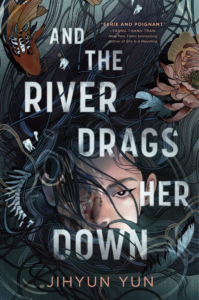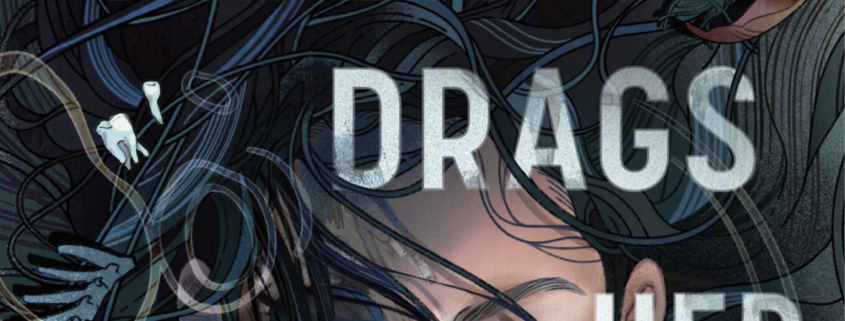And the River Drags her Down by Jihyun Yun
On the blog today, we welcome Jihyun Yun sharing some insights about her book, And the River Drags her Down.

Why YA needs a touch of darkness – and how writing about loss and grief helps young people confront their own emotions within the safety of fiction
Last year, I attended a dinner party where friends gathered and asked each other between bites of bread and soup: what is your hope for the new year? The answers were largely as expected. A wish for good health. A wish for good fortune, for the self and for loved ones. And then we got to a friend’s teenaged son, who, alone amongst adults, had said not a word for the entire night. He hesitated for a moment, cutlery faltering over his plate, before he said haltingly: “I want to be a safe place to land for the people around me.”
Is there a more disdained age category than the teens? As a society, we disdain every aspect of them: the media they love; their large, oscillating feelings; their worries and desires—as if still developing precludes them from having complex inner worlds of their own. It can’t be farther from the truth.
I’ve always been of the belief that our worlds shrink as we enter adulthood—increasingly so with each decade we age. Our lives become insular, perhaps inevitably so as we transition into intensifying responsibilities to those in our inner circle: the obligations of work, perhaps children in our care, or aging parents in need of assistance.
But something that always strikes me when I speak to young people is this: teenagers very much shoulder the weight of the world in a way many adults can no longer accommodate. Their apertures have not yet narrowed and so they are attentive to it all: the plights of communities both theirs and far flung. Their burdens are a holistic burden. And yes, of course this means they are privy, perhaps more acutely than most, of global injustices and interpersonal horrors. Why wouldn’t they be?
–
When I was drafting my novel AND THE RIVER DRAGS HER DOWN, I was often met with the critique that the book “didn’t read as YA.” This comment always perplexed me, because so many aspects of the book are so textbook YA: self-discovery, teen protagonists navigating their roles at home, the shifting dynamics with their parents and communities as their lives inch away from childhood. The elaborations on this critique only confused me more: the book didn’t read as YA because the subject matter was too dark, and the handling of it too frank.
This, I think, stems from the idealistic hope that teens by virtue of being so young will be insulated from harm. A futile hope that even those who espouse them understand is not true. But when you are suffering or grieving, what can be more invalidating than everyone patting your shoulder as if to say, it’s okay. It’ll all be okay. And then leaving it at that?
I think there is something bracing about seeing your own situation reflected back at you in media—even if the circumstances are devastating. If only for the reminder that you are not alone. Even in your sadness, your loneliness—knowing you are in communion with others all around the world who are donning the same dark cloak as you can be a comfort.
This is where darkness in YA literature comes in. It holds the mirror up to the reader and says, I see you as you are seeing me. I take your sadness seriously. But unlike real life, the book is a safe space where the sadness is contained. The reader can explore their own
relationship to it—that ineffable sadness—and if the seeing becomes too harrowing, they can put it down, on a shelf, away. They can assert a little agency over how hurt will find them, and thus defang it in that way.
And so no, my novel does not flinch away from showing the full breadth of what grief and death and resentment can do to a life. I slow the pace down, elongate time just to force readers to spend longer with the simultaneous discomfort and mundanity of grief—the way the most prosaic things can hurt someone suffering active bereavement. I do this because I respect young readers enough to trust them to know when they need to close the book. I do this in the hopes that when they’ve rallied and decide to pick it up again, they trust that it is a safe place to land.
Views expressed do not necessarily reflect those of the Federation.



